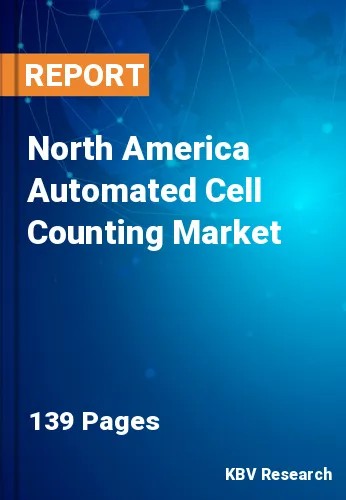Chapter 1. Market Scope Methodology
1.1 Market Definition
1.2 Objectives
1.3 Market Scope
1.4 Segmentation
1.4.1 North America Automated Cell Counting Market, by Product
1.4.2 North America Automated Cell Counting Market, by Application
1.4.3 North America Automated Cell Counting Market, by End-use
1.4.4 North America Automated Cell Counting Market, by Country
1.5 Methodology for the research
Chapter 2. Market at a Glance
2.1 Key Highlights
Chapter 3. Market Overview
3.1 Introduction
3.1.1 Overview
3.1.1.1 Market Composition and Scenario
3.2 Key Factors Impacting the Market
3.2.1 Market Drivers
3.2.2 Market Restraints
Chapter 4. Competition Analysis - Global
4.1 KBV Cardinal Matrix
4.2 Recent Industry Wide Strategic Developments
4.2.1 Partnerships, Collaborations and Agreements
4.2.2 Product Launches and Product Expansions
4.2.3 Acquisition and Mergers
4.2.4 Trials and Approvals
4.3 Top Winning Strategies
4.3.1 Key Leading Strategies: Percentage Distribution (2019-2023)
4.3.2 Key Strategic Move: (Product Launches and Product Expansions: 2019, Jun 2022, Sep) Leading Players
4.4 Porter Five Forces Analysis
Chapter 5. North America Automated Cell Counting Market by Product
5.1 North America Consumables Accessories Market by Region
5.2 North America Instruments Market by Region
5.3 North America Automated Cell Counting Market by Instruments Type
5.3.1 North America Image-based Cell Counters Market by Country
5.3.2 North America Flow Cytometers Market by Country
5.3.3 North America Electrical Impendence Coulter Counters Market by Country
Chapter 6. North America Automated Cell Counting Market by Application
6.1 North America Cell Line development Market by Country
6.2 North America Blood Analysis Market by Country
6.3 North America Stem Cell Research Market by Country
6.4 North America Others Market by Country
Chapter 7. North America Automated Cell Counting Market by End-use
7.1 North America Pharmaceutical Biotechnology Companies Market by Country
7.2 North America Hospitals Diagnostic laboratories Market by Country
7.3 North America Research Academic Institutes Market by Country
7.4 North America Others Market by Country
Chapter 8. North America Automated Cell Counting Market by Country
8.1 US Automated Cell Counting Market
8.1.1 US Automated Cell Counting Market by Product
8.1.1.1 US Automated Cell Counting Market by Instruments Type
8.1.2 US Automated Cell Counting Market by Application
8.1.3 US Automated Cell Counting Market by End-use
8.2 Canada Automated Cell Counting Market
8.2.1 Canada Automated Cell Counting Market by Product
8.2.1.1 Canada Automated Cell Counting Market by Instruments Type
8.2.2 Canada Automated Cell Counting Market by Application
8.2.3 Canada Automated Cell Counting Market by End-use
8.3 Mexico Automated Cell Counting Market
8.3.1 Mexico Automated Cell Counting Market by Product
8.3.1.1 Mexico Automated Cell Counting Market by Instruments Type
8.3.2 Mexico Automated Cell Counting Market by Application
8.3.3 Mexico Automated Cell Counting Market by End-use
8.4 Rest of North America Automated Cell Counting Market
8.4.1 Rest of North America Automated Cell Counting Market by Product
8.4.1.1 Rest of North America Automated Cell Counting Market by Instruments Type
8.4.2 Rest of North America Automated Cell Counting Market by Application
8.4.3 Rest of North America Automated Cell Counting Market by End-use
Chapter 9. Company Profiles
9.1 Shanghai Ruiyu Biotechnology Co., Ltd. (Alit Biotech (Shanghai) Co., Ltd.)
9.1.1 Company Overview
9.2 Thermo Fisher Scientific, Inc.
9.2.1 Company Overview
9.2.2 Financial Analysis
9.2.3 Segmental and Regional Analysis
9.2.4 Research Development Expenses
9.2.5 Recent strategies and developments:
9.2.5.1 Partnerships, Collaborations, and Agreements:
9.2.5.2 Product Launches and Product Expansions:
9.2.5.3 Acquisition and Mergers:
9.2.6 SWOT Analysis
9.3 Bio-Rad laboratories, Inc.
9.3.1 Company Overview
9.3.2 Financial Analysis
9.3.3 Segmental and Regional Analysis
9.3.4 Research Development Expenses
9.3.5 SWOT Analysis
9.4 F. Hoffmann-La Roche Ltd.
9.4.1 Company Overview
9.4.2 Financial Analysis
9.4.3 Segmental and Regional Analysis
9.4.4 Research Development Expense
9.4.5 Recent strategies and developments:
9.4.5.1 Partnerships, Collaborations, and Agreements:
9.4.5.2 Product Launches and Product Expansions:
9.4.6 SWOT Analysis
9.5 Danaher Corporation
9.5.1 Company Overview
9.5.2 Financial Analysis
9.5.3 Segmental and Regional Analysis
9.5.4 Research Development Expense
9.5.5 SWOT Analysis
9.6 Olympus Corporation
9.6.1 Company Overview
9.6.2 Financial Analysis
9.6.3 Segmental and Regional Analysis
9.6.4 Recent strategies and developments:
9.6.4.1 Product Launches and Product Expansions:
9.6.5 SWOT Analysis
9.7 Merck KGaA
9.7.1 Company Overview
9.7.2 Financial Analysis
9.7.3 Segmental and Regional Analysis
9.7.4 Research Development Expense
9.7.5 Recent strategies and developments:
9.7.5.1 Product Launches and Product Expansions:
9.7.6 SWOT Analysis
9.8 Abbott Laboratories
9.8.1 Company Overview
9.8.2 Financial Analysis
9.8.3 Segmental and Regional Analysis
9.8.4 Research Development Expense
9.8.5 Recent strategies and developments:
9.8.5.1 Trials and Approvals:
9.8.6 SWOT Analysis
9.9 Sysmex Corporation
9.9.1 Company Overview
9.9.2 Financial Analysis
9.9.3 Regional Analysis
9.9.4 Research Development Expense
9.9.5 Recent strategies and developments:
9.9.5.1 Partnerships, Collaborations, and Agreements:
9.9.5.2 Product Launches and Product Expansions:
9.9.6 SWOT Analysis
9.10. Agilent Technologies, Inc.
9.10.1 Company Overview
9.10.2 Financial Analysis
9.10.3 Segmental and Regional Analysis
9.10.4 Research Development Expense
9.10.5 Recent strategies and developments:
9.10.5.1 Product Launches and Product Expansions:
9.10.5.2 Acquisition and Mergers:
9.10.6 SWOT Analysis

